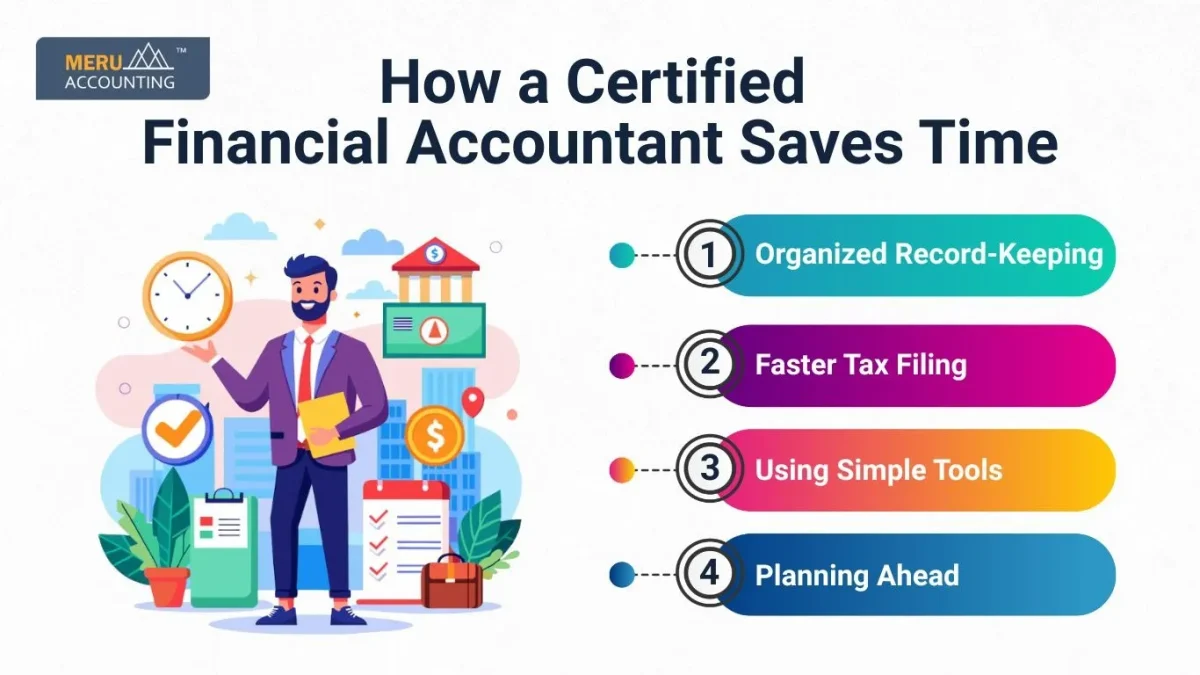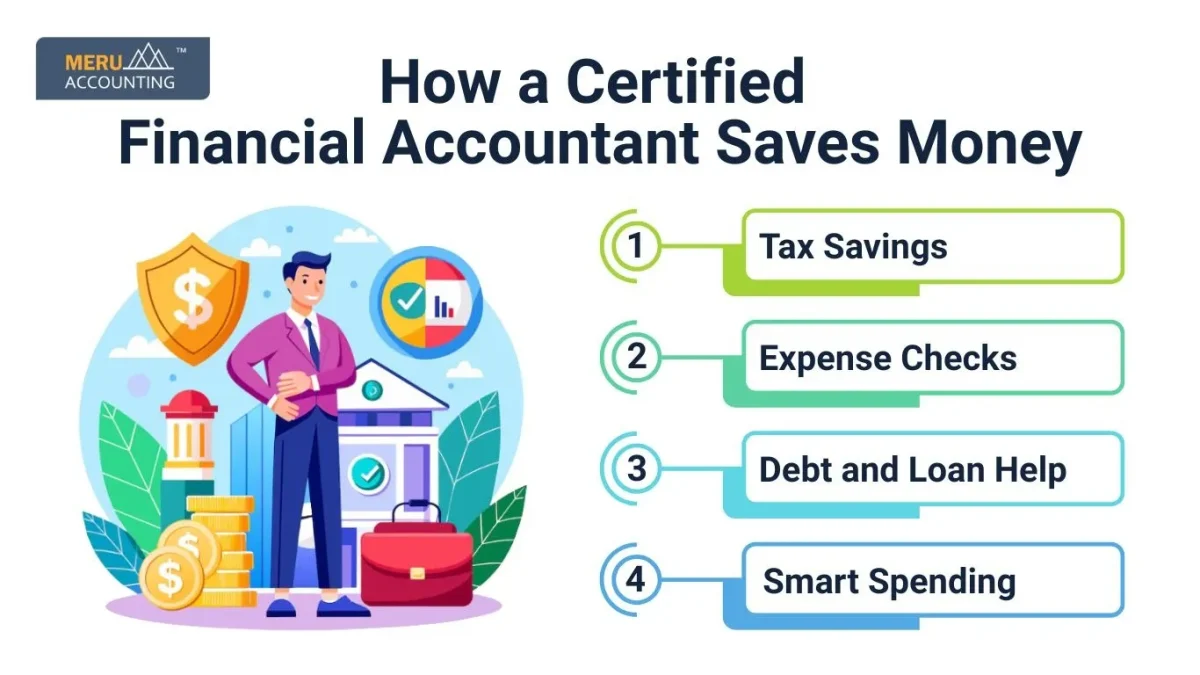How a Certified Financial Accountant Helps You Save Money and Time
Handling money can feel hard for many businesses. Business owners spend hours tracking income, costs, and invoices for the betterment of their business. But, they often come across many mistakes. These mistakes whether small or big can cost money. Even small mistakes can grow over time and affect the business’s growth. A certified financial accountant can help business owners deal with everything related to finance of their business. But, do you know how they can help you save time and money?
A certified financial accountant does more than record transactions. They check accounts, plan ahead, and help in money-related decisions. Small businesses, freelancers, and medium-sized companies can all benefit from the same. In this blog, we will see how you can save time and money with a certified financial accountant.
Who Is a Certified Financial Accountant?
A Certified financial accountant is trained to manage all types of business finances. They track money in and out. They prepare statements, plan taxes, and advise on budgets.
Unlike a regular bookkeeper, a certified accountant uses certified financial accounting rules. This keeps records complete and correct. Banks, investors, and tax offices often need this level of care. A certified accountant may also spot errors that a regular bookkeeper might miss. This reduces future problems and prevents fines.
Certified accountants may also help owners understand numbers better. Many business owners do not enjoy reading spreadsheets or reports. A certified accountant can explain the same information in plain words. This makes decision-making a lot easier.
How a Certified Financial Accountant Saves Time
Time is one of the most precious resources for a business. Mistakes and delays can waste hours. A certified financial accountant reduces these problems and improves work speed by:
Organized Record-Keeping
They can set up systems to track income and costs automatically. This cuts time spent on manual bookkeeping. Organized records allow faster reports and fewer mistakes. Business owners can quickly check how the company is doing without searching for receipts or invoices. This system also helps during audits or tax season, saving even more time.
Faster Tax Filing
Taxes take many hours to do alone. Certified accountants know what forms are needed. They file taxes on time. This avoids fines for being late. They may also advise on small adjustments to reduce tax liability. For example, a missed deduction could cost hundreds or thousands in extra payment. By catching this early, they save both money and time.
Using Simple Tools
Many accountants use software for reports, invoices, and checks. This cuts repeated work. Owners can see numbers fast without sorting through papers. Software can also help track inventory, expenses, and payments. Using tools correctly reduces human error and makes reporting simpler.
Planning Ahead
A certified financial accountant can spot low-cash times. They suggest ways to avoid problems before they happen. Planning ahead saves time fixing urgent issues later. They may also guide when to buy equipment or pay suppliers. Making these decisions with numbers rather than guesswork saves hours of stress.
How a Certified Financial Accountant Saves Money
Saving money is not just cutting costs. It is also stopping waste and making smart choices. Certified financial accounting can show ways to save these problems by:
Tax Savings
A certified financial accountant finds deductions and credits. This lowers the taxes owed. Proper planning avoids extra payments and fines. They may also advise on timing purchases or payments to reduce tax bills. Small adjustments can add up to large savings over time.
Expense Checks
They review costs to find waste. This can include unused services, extra spending, or inefficient practices. Cutting waste saves money. For example, a business may pay for software that is never used. Identifying this reduces unnecessary costs and frees cash for important needs.
Debt and Loan Help
Certified financial accounting can guide loan payments. Accountants may suggest changes to cut interest. Avoiding late fees adds more savings. They may also help negotiate better loan terms. This reduces the burden on cash flow and prevents unnecessary payments.
Smart Spending
A certified financial accountant can guide purchases of tools or stock. They use clear numbers to show cost-safe choices. Good planning prevents expensive mistakes. They may also suggest when to delay purchases or buy in bulk for discounts. Over time, this helps a business keep more money in its account.
Real-Life Examples
Small Business Tax Filing
Many small business owners do taxes alone. Missing deductions or reporting errors can cost money. A certified financial accountant makes taxes right. They prepare papers and check claims to save money. For example, a small shop owner may miss a deduction for vehicle use. Catching this can save hundreds of dollars.
Seasonal Cash Problems
Businesses with seasonal income may face low-cash months. Certified accountants forecast money coming in and plan bills. They may suggest temporary help or adjust spending. For example, they can help decide whether to delay equipment purchases or hire temporary staff during slow months.
Business Growth Planning
When a business wants to grow, clear money info is key. Certified financial accounting gives profit checks, cost tests, and risk notes. Owners can decide with confidence using real numbers. For example, an accountant may show that adding a new product line will be profitable or suggest smaller steps first to reduce risk.
Benefits Beyond Money and Time
A certified financial accountant gives more than cash or hours saved.
- Less Stress: Right records prevent worry about audits or late bills.
- Correct Records: Current statements keep finances clear.
- Smart Decisions: Choices come from facts, not guesses.
- Trust: Banks and partners value exact records.
- Growth Help: Right numbers support loans, hires, or growth.
They may also advise on staff costs, supply deals, or other routine spending. Even small improvements add up and reduce stress for the owner.
How to Choose a Certified Financial Accountant
Not all accountants are equal. Picking the right one adds value. At Meru Accounting, we house only certified financial accountants to make sure our services remain consistent across clients. Consider the below aspects we follow:
- Know Your Industry: Experience in your field improves advice.
- Check Reviews: Past clients show trustworthiness.
- Clear Talk: They explain numbers in plain words.
- Tool Skills: Knowing simple software speeds work.
- Availability: An accountant who is reachable for questions adds value over one who is hard to contact.
We make sure to provide all of these in our outsourced accounting and bookkeeping services.
Myths related to Financial Accountants
Some think certified accountants are only for big firms. Others think they cost too much. But, these myths are busted as:
- Even small businesses save more than they spend through proper tax checks.
- Certified accountants handle daily books and money advice.
- Using simple tools, they make work faster and easier.
How to Get the Most from an Accountant
- Give Full Records: Complete info lets them guide better.
- Ask Questions: Knowing advice prevents mistakes.
- Meet Often: Monthly or quarterly talks keep control.
- Use Tools: Cloud or software tools make tasks easier.
- Plan Ahead: Tell them of future changes for correct checks.
- Track Progress: Ask the accountant to show savings or hours gained.
- Follow Advice: Implement their recommendations to get results.
A Certified financial accountant saves time, stress, and money. Professional advice makes finances simple, stops mistakes, and lets owners focus on growth. Spending on a certified accountant often returns saved money, clear records, and peace of mind. At Meru Accounting, we help business owners save time and money with reliable accounting and bookkeeping services. Contact us now to start saving time and money in your business.
FAQs
- What does a financial accountant typically do for a business?
They manage and analyze financial records to keep your company’s money accurate, organized, and compliant. - How can an accountant help a business save money?
By improving tax deductions, reducing wasteful spending, and offering better financial strategies. - Do small businesses really need an accountant?
Yes — clean records, tax support, and budget guidance are valuable even for very small companies. - Can a certified financial accountant handle business taxes?
Yes. They can prepare, review, and file tax returns while ensuring compliance. - What exactly does “financial accounting” mean?
It refers to keeping financial records accurate using established accounting rules and standards. - How much does it usually cost to hire an accountant?
Fees vary by service and location, but the savings in time and stress often outweigh the cost. - Can an accountant predict or project a company’s cash flow?
Yes. They can help you anticipate low-cash periods and plan ahead. - Do accountants help during audits?
Yes. They gather documentation, organize records, and guide you through the process. - Will an accountant also take care of bookkeeping?
Many do. They handle day-to-day tracking of income, expenses, and transactions. - Is a certified financial accountant worth hiring for most businesses?
For most companies, yes — their expertise saves time, reduces errors, and improves decision-making. - Can an accountant advise on business growth plans?
Yes. They can guide hiring decisions, equipment purchases, and expansion strategies. - Do accountants use software tools?
Yes. At Meru Accounting, we use software like QuickBooks or Xero to help streamline work. - Can they help reduce the risk of fines or penalties?
Yes. Proper filing and accurate bookkeeping prevent costly mistakes. - How often should I talk with my accountant?
Monthly or quarterly meetings work for most businesses. - Do accountants manage payroll?
Many offer payroll services or can help you set up reliable systems. - Can financial accountants assist with business loan applications?
Yes. They prepare financial statements and documents lenders require. - Do accountants track expenses?
Yes. They categorize and monitor spending to support better budgeting. - Can financial accountants help create a budget for the business?
Absolutely. They build practical, realistic spending plans. - Do accountants advise on financial risks?
Yes. They help you understand risks and make safer choices. - Are your services only available in the U.S.?
No. We serve globally, providing complete accounting and bookkeeping for businesses of all types.










